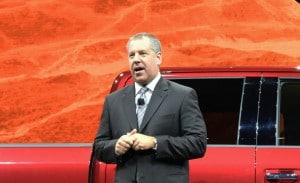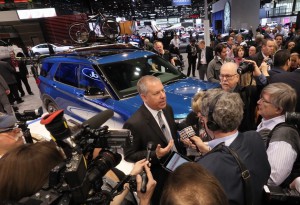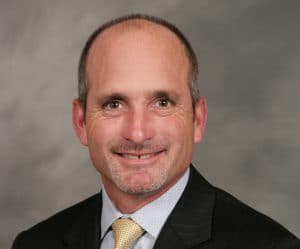
Joe Hinrichs, former president of automotive operations at Ford Motor Co., has joined the board of WaveSense.
This story has been updated.
Joe Hinrichs, the former head of automotive operations for Ford Motor Co., is making a return, of sorts, as a new board member of WaveSense, a startup developing autonomous driving technology.
The Massachusettes-based firm appears to be beating the bushes in search of automotive industry veterans. WaveSense also added former General Motors Chief Financial Officer Chuck Stevens and Kurt Lehmann, former chief technology officer for mega-supplier Continental AG, to its advisory board.
WaveSense is taking an unusual approach to the development of autonomous technology, focusing on ground-penetrating radar, rather than the cameras, radar and laser-based LIDAR systems more commonly used.
(Ford names Farley COO; President, Automotive Hinrichs retires.)
The 53-year-old Hinrichs was unexpectedly encouraged to “retire” from Ford last March, the second-largest automaker going through a major shake up in senior management. The move came at a time when Ford was struggling with plunging profits and a weakening share price. Some analysts pointed the finger at Hinrichs – others calling him the “fall guy” – for the botched 2019 relaunch of the automaker’s popular Explorer SUV.
Shortly after leaving Ford, Hinrichs told TheDetroitBureau.com that he was not planning to leave the automotive business and was exploring numerous options.
“Life’s too short to let things get in the way of you enjoying it,” Hinrichs told the Bloomberg news service as his move to join WaveSense was announced. “I’m too young to stay not working forever, but I’m also old enough now to have perspective on life. I have options, and I get to take a break and be a little choosy about what I do next. So I just keep it all in balance. The glass is always half full or better with me.”
Hinrichs is considering further opportunities and could take additional board seats. At the same time, he indicated that he is not looking for a high-level job that would require his day-to-day participation, focusing instead on losing weight, getting in shape and “really decompressing and relaxing.”

Hinrichs said he was too young to not work again, but old enough to use his experience to get him the types of roles he wants.
Even if they serve simply in an advisory role, the arrival of three high-profile industry veterans could be critical for WaveSense, which was founded in 2017 as a spinoff from MIT Lincoln Labs, a Department of Defense R&D Center.
(Ford sales dropped in 2019 despite strong truck results.)
In a profile, the company says its goal is to “radically accelerat(e) the arrival of self-driving vehicles by tackling some of the most challenging problems that stand in the way of safe and reliable navigation.”
Currently, three types of sensors are being used as the primary technology enabling cars to drive autonomously: high-resolution cameras, conventional radar and LIDAR, a digital, three-dimensional form of laser sensing. In addition, automakers are pre-mapping roadways to offer a level of detail far above that of conventional, onboard navigation systems.
WaveSense, however, is turning to a technology it first used in Afghanistan in 2013 which “allowed military vehicles to stay on previously-mapped routes by matching radar measurements with maps of subterranean geology. This enabled precise navigation of 9-ton military vehicles, despite unmarked lanes and poor visibility from sand and dust.”
Similiarly, WaveSense plans to map roads in the U.S. and other countries, providing a unique profile that it claims can precisely locate where a vehicle is operating.
The company is now working with automakers to demonstrate the benefits of the technology and hopes to be in production within three to four years, according to CEO Tarik Bolat who noted in a statement that he expects to soon make “some fundraising announcements.”
(This could be the make-it-or-break-it year for Ford.)
For his part, Hinrichs said WaveSense expects its radar technology to be a “significantly lower cost solution” than LIDAR. That price of that laser-based technology is one of the reasons why many analysts believe fully autonomous, or so-called Level 4 and Level 5, vehicles aren’t expected to be ready for mass market consumer sales until late this decade, at the earliest.



Good for Hinrichs. Being on the board is a lot less stressful than being in a top spot.